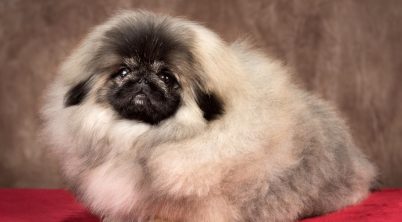The Pekingese is a small dog breed known for its distinctive appearance and royal history. Regarding longevity, the Pekingese tend to have a life expectancy that offers potential companions many years of affectionate partnership.
Life Expectancy Range: Typically, a Pekingese dog is expected to live between 12 to 15 years. This breed can thrive well into their teens with the proper care and attention.
Key Lifespan Data:
- Average Lifespan: 12 to 15 years
- Recorded Maximum Lifespan: Up to 18 years
Factors Influencing Lifespan:
Healthcare and Genetics: Genetics play a crucial role, but access to regular, quality healthcare significantly enhances longevity.
Nutrition: Eating the right mix of food helps Pekingese dogs live longer.
Grooming and Exercise: Grooming and appropriate levels of exercise contribute to overall health, which in turn, impacts lifespan.
Top Causes of Mortality: Studies show heart and breathing problems are the big threats, so vets check them often.
In sum, the Pekingese is poised to grace their owners’ lives for a considerable period, with many factors under owners’ control to help ensure a full, robust lifespan.
Table of Contents
Understanding the Pekingese Lifespan
Pekingese dog breed looks like a lion and acts fancy. It usually lives for 12 to 15 years. This time is affected by genes, surroundings, and health care.
Factors Influencing Lifespan
- Genetics: Genes affect how long Pekingeses live. Choosing who mates can pass good things and health issues on.
- Environment: The environment in which a Pekingese lives can have a substantial effect on their lifespan. Factors such as diet, exercise, housing, and stress levels all contribute to their overall well-being.
- Veterinary Care: Normal pet doctor check-ups are very important for finding and handling sickness, giving shots against sickness, and giving advice on good food and care. These check-ups make sure pets stay healthy and strong.
Common Health Concerns
- Brachycephalic Airway Syndrome: Because they have short noses, Pekingeses can have trouble breathing and get too hot.
- Eye issues: Inherited issues can bring about blindness and other problems in eyes.
- Patellar Luxation: This is a common orthopedic issue where the kneecap slips out of place.
- Obesity: Excess weight can lead to joint problems, diabetes, and heart disease.
- Heart Disease, Cancer, and Arthritis: These conditions are prevalent among aging Pekingeses and can affect their longevity.
Pekingese Life Expectancy Statistics
- Average Lifespan: Pekingeses have an average life expectancy of 13 to 15 years, although this range can vary based on the individual dog’s health and care.
- Common Causes of Death: Typically, the leading causes of death in Pekingeses include organ failure, heart disease, and cancer.
- Improving Longevity: To potentially extend the lifespan of Pekingeses, strict attention to diet, regular exercise, preventative health measures, and good dental care are recommended.
It is essential for Pekingese owners to understand these key elements contributing to their pet’s lifespan to provide the best care and potentially enhance their longevity.
Caring for Your Pekingese
When it comes to ensuring the longevity and well-being of your Pekingese, focusing on proper nutrition and adequate physical activity is essential. A balance of high-quality dog food and regular exercise tailored to the breed’s needs can create a stress-free environment conducive to their health.
Optimal Nutrition and Diet
Feeding your Pekingese high-quality dog food is crucial for their overall health. A balanced diet suited to their age, weight, and energy levels is important. Pekingese should have a diet that includes:
- Proteins: Essential for muscle development and repair.
- Fats: For energy and maintaining a healthy coat.
- Carbohydrates: Provide fiber and energy.
- Vitamins and Minerals: For overall health and preventing diseases.
Employing pet health insurance can help manage the costs of high-quality nutrition and routine health checks. Create a feeding schedule and stick to it, avoiding overfeeding to prevent obesity, which can stress their small bodies.
Exercise and Physical Activity
Pekingese require moderate exercise to maintain their health. Their exercise needs include:
- Daily walks: Two 15 to 20-minute walks to maintain cardiovascular health.
- Playtime: Playing helps calm and excite brains.
Despite their small size, Pekingese need regular grooming, which includes brushing their long coats to prevent mats, cleaning their nails, and periodic baths. A clean and well-groomed Pekingese is a happy and healthy Pekingese.
Pekingese Physical Characteristics
The Pekingese is a compact and stocky toy breed, well-known for its distinctive physical attributes that adhere to breed standards. This little dog kind has a different short face, seen by a short nose that adds to its look. Pekingese dogs typically possess a rolling gait, a product of their physique, reflecting their dignified and composed nature.
Size and Weight:
- Height: 6-9 inches
- Weight: Up to 14 pounds
Their compact size categorizes them as a member of the toy breeds, making them suitable companions for those residing in smaller spaces, such as apartments. Even though Pekingese are little, they are quite strong and solid.
Coat and Colors: Pekingese have a long, luxuriant coat that comes in a variety of colors. The most common coat colors include:
- Red
- Tan
- Cream
- Black
- White
The breed is known for its flowing mane, which requires regular grooming to maintain its splendor. Their tails are characteristically carried over their back, adding to their poised appearance.
It is imperative for potential owners to recognize that although Pekingese are small, they are not fragile. Their confident demeanor and robust build make them a popular choice for those who appreciate the qualities of small dog breeds with a relatively assertive presence.
Behavioral Aspects and Social Needs
The Pekingese breed exhibits a distinct personality characterized by confidence and loyalty. These dogs are often seen as affectionate and loyal companions, forming strong attachments to their owners. They thrive on attention and return affection readily to those they trust.
Personality Traits:
- Confidence: Pekingese carry themselves with a self-assured poise that is reflective of their royal ancestry.
- Loyal Companionship: They are devoted to their family, often forming a particularly close bond with a single person.
Providing adequate mental stimulation is crucial for the well-being of a Pekingese. Smart dogs like to play games that make them think, which helps to reduce worry and fear.
Social Needs:
- Attention and Affection: Spending time together is important. Not giving attention can cause separation worries. Bonding time is important. Ignoring can make it hard to be apart.
- Mental Stimulation: Activities such as puzzle toys or hide-and-seek with treats can help keep their minds active.
As guard dogs, Pekingese may show protective behavior and be watchful of strangers, so they need to get used to being around others from a young age to avoid becoming too worried.
Managing Anxiety:
- Separation Anxiety: Pekingese may experience anxiety when left alone for extended periods, which can manifest in destructive behavior.
- Stress Reduction: Having regular habits and peaceful surroundings can reduce worry and make pets feel peaceful. It’s important to have regular habits and peaceful surroundings to reduce worry and feel calm.
Health Care and Preventive Measures
Maintaining the health of a Pekingese requires attentive care and a regimen of preventive measures. Regular veterinary care is essential in catching and addressing health issues early on. A veterinarian should monitor the dog’s health, ensuring it receives vaccinations to prevent common canine diseases.
Pekingese are susceptible to several health conditions, such as congestive heart failure, allergies, and skin allergies. Dry eye, called keratoconjunctivitis sicca, is a worry for this dog breed. Regular check-ups help find and treat these problems early.
The administration of necessary medications as prescribed by a professional is crucial for treating and managing Pekingese health problems. Owners should ensure their dogs are current on all vaccinations and treatments to safeguard against illness.
Neutering or spaying can also contribute to a healthier life by preventing certain types of cancers and reducing the risk of behavioral issues. These procedures should be discussed with a veterinarian to understand their benefits fully.
Pet owners need to keep their pet healthy by taking them for regular check-ups at the vet.
- Regular Evaluations: It’s important to stick to a routine and make sure the pet gets looked at often.
- Proper Nutrition: Provide a balanced diet, appropriate for the Pekingese breed.
- Exercise: Engage in moderate exercise to maintain a healthy weight and reduce the risk of heart problems.
- Allergy Management: Address any signs of allergies immediately to prevent discomfort and more serious complications.
- Eye Care: Due to the risk of dry eye, ensure that the Pekingese’s eyes are kept moist and clean.
Through diligent health care and preventive strategies, owners can play a pivotal role in prolonging the life and enhancing the well-being of their Pekingese.
* Banner photo by GeekAtHeart, cropped | Some rights reserved








